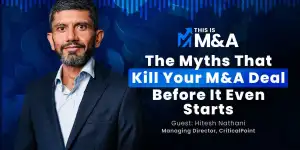What to Consider When Choosing an M&A Advisor

Because most people don’t usually have the expertise, contacts, or time to sell their business, it’s usually a bad idea for the entrepreneur selling a company to tackle the M&A market without help from an experienced M&A advisor. Retaining experience from an advisor, who deals with due diligence, negotiation, and integration challenges day in and day out, helps ensure that business owners don’t approach the sales process naively or ill-prepared.
There are always rough patches in the process, and a savvy advisor knows how to navigate them to help secure a successful outcome for the seller. But choosing the right M&A advisor for your deal can be challenging. Choosing poorly can have dire consequences, including reduced deal value or even a deal that gets completely derailed. Choosing wisely, on the other hand, can result in a deal with a high valuation that moves smoothly to a close.
So, what should you consider when evaluating potential M&A professionals who all claim they’re the best for the job? It may seem a little far-fetched, but we suggest evaluating potential M&A advisors much like you would a babysitter. It’s really not that far-fetched. After all, your business is your baby.
 #1 TRAINING & EXPERIENCE
#1 TRAINING & EXPERIENCE
You expect your babysitter to have taken a training course and be certified in CPR. The same should hold true for an M&A advisor. Your business is unique, so ensure that the M&A advisor you choose has the proper training and experience for your situation.
You expect your babysitter to have taken a training course and be certified in CPR. The same should hold true for an M&A advisor. Your business is unique, so ensure that the M&A advisor you choose has the proper training and experience for your situation.
Ask what comparable transactions they’ve completed of companies of your size in your industry. Are the transactions recent? Recent industry experience will ensure that they have up-to-date insight into market activity in your space and a foundation of knowledge for preparing your marketing materials. Industry experience is also a must in hiring someone who is forward-thinking and can expect the unexpected.
Equally enlightening can be recent transactions the M&A advisor worked on that didn’t close. While deals can fall apart for a variety of reasons, many of which are out of the advisor’s control, you’ll want to decipher if the reasons sound legitimate or if there appears to be a pattern of failure.
#2 REPUTATION
You wouldn’t hire a babysitter without some good referrals. Request to speak with several of the business owners the advisor has worked with and ask them if they were satisfied with how the transaction progressed, and if they would engage the advisor again. Ask how hard the advisor worked, if they stayed focused, and who were the individuals that really completed the work. You want to make sure you know who your team is ahead of time to ensure you have experienced members.
Also, interview any attorneys, accountants, bankers and other professionals who work with the advisor. Are they reputable? The company your advisor keeps is a good indicator of his or her standing in the M&A field and business community.
#3 THE DEAL TEAM

If you’re working with a larger firm, find out what the role of each deal professional will be during the transaction process. You may be comfortable with junior advisors handling the early stages of preparing materials for your company, but you’ll likely want a more senior advisor to bring his or her years of experience to the table when it comes time to have more serious conversations with potential acquirers. Also, inquire into how many clients the firm normally takes on in a year and try to get a sense for how much of their resources will be dedicated to your transaction.
#4 VALUATION
Good M&A advisors are informed enough on industry trends, current market activity, average multiples and other valuation factors to provide a ballpark figure for what your company is worth. If that valuation assessment is not in line with internal expectations, feel free to disagree. Just be prepared to justify your number with your own valuation methodologies.
Be careful not to enter the conversation with unrealistic expectations about your company’s value and be sure to listen to how your advisor arrived at his rationale. And lastly, remember that, at the end of the day, don’t forget that your business is only worth as much as someone is willing to pay for it.
If you would like to learn more about how to achieve a high M&A Valuation, check out our white paper.
#5 FEE STRUCTURES
How much does your babysitter charge? It may be tempting to simply choose an M&A advisor that charges the lowest fees; however, you should treat this decision as an investment in your business. Your goal should be to maximize the ROI from hiring the right bank to get you the highest purchase price for your company.
M&A advisory firms typically charge some combination of a retainer and a success fee for their services. This will vary from firm to firm, but you should look for a structure that strikes a balance. Firms that charge a large upfront retainer, but little in the way of success fees, may be less motivated to get a deal done. On the other hand, firms that take on clients on a success fee-only basis may be playing a numbers game and don’t actually close a higher percentage of the engagements they take on.
Always verify the length of the contract and ask if the services will be unbundled or bundled. If you think you may locate a buyer or seller yourself at some point in the process, but know you’ll need help with other aspects of the transaction, you can request a fee reduction provision in the contract. But if you’re confident that you want the advisor to handle the entire process, a bundled contract is appropriate.
#6 STRATEGY
A good babysitter will undoubtedly have some tricks or a plan for getting your baby to sleep. Don’t be afraid to ask your M&A advisor about their specific plan or strategy to meet your goals. Request a timeline that contains specific milestones and a detailed description of what the advisor will do at each stage in the process. Ideally, the firm you choose will have developed a repeatable model that is tied to the company’s strategy and customized to its experience with the goal of delivering superior returns.
Also, keep in mind that your best exit strategy may be to wait. You might be surprised to learn that many M&A advisory firms are happy to consult with you on ways to add value to your business, even if you are looking at a longer exit horizon. These firms know that building a long-term relationship with you now will be beneficial in the future. Because they’ve earned your trust, you will likely feel comfortable hiring them to represent you when you are ready to sell.
A good advisory firm may be able to counsel you on growth opportunities in your industry that could be pursued in the several years leading up to a sale. Since a banker’s fee is ultimately tied to the price they help you get for your business, it’s in their best interest to offer advice and insights that help you maximize your company’s growth and value in the years preceding a sale.
#7 CHEMISTRY

Wrap Up
Any sale process is going to experience setbacks and challenges. Today’s buyers are merciless when scrutinizing a business. They ask difficult questions, may disagree with your views of the market, and may challenge your valuation assumptions. The M&A advisor, who is the right fit for your business, can anticipate these challenges and proactively address issues that will put you in a better position as you enter the market. The right advisor for you is the one that not only takes the time to get to know you and your business, but the one that can adapt to changing market conditions and remain flexible when the unique nuances of your sale process arise.




